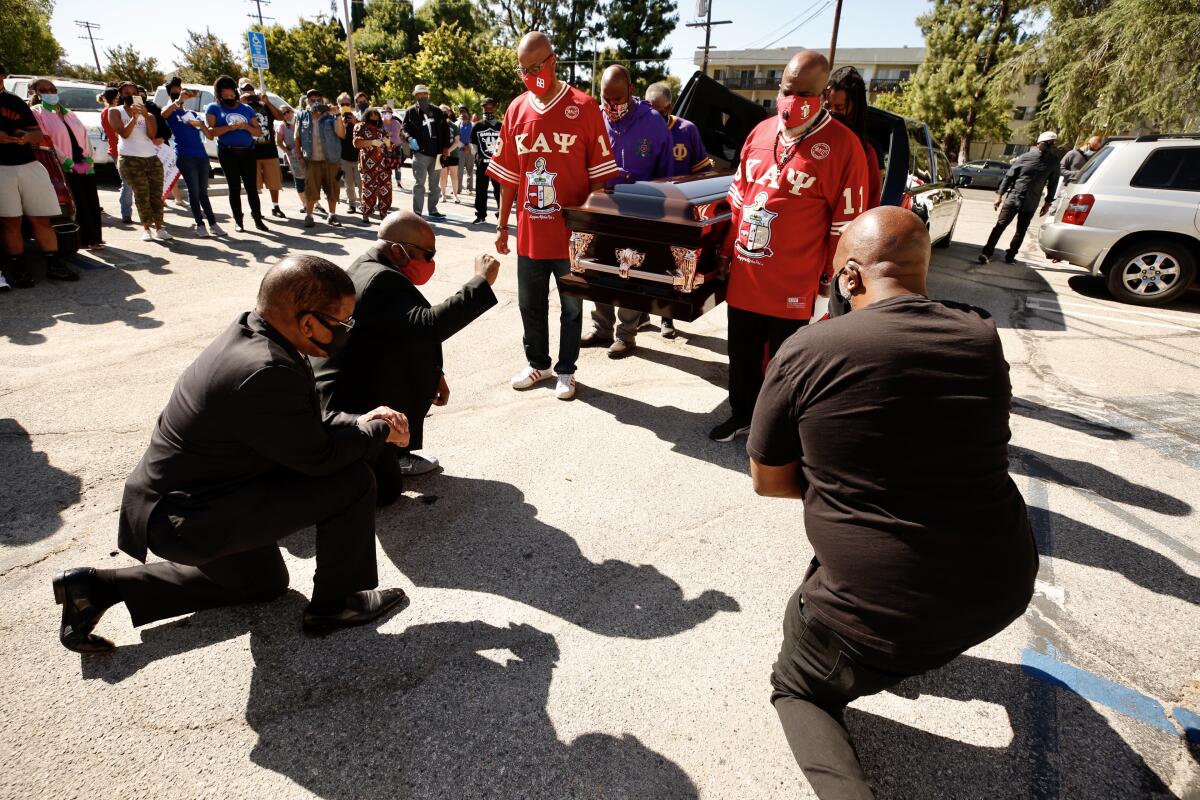Essential California Week in Review: Protests and coronavirus

- Share via
Good morning, and welcome to the Essential California newsletter. It is Saturday, June 13.
Sign up for Essential California
The most important California stories and recommendations in your inbox every morning.
You may occasionally receive promotional content from the Los Angeles Times.
Here’s a look at the top stories of the last week:
The coronavirus lingers. The coronavirus transmission rate in Los Angeles County is climbing again as the economy reopens. Officials said the increase in disease transmission largely reflected infections that occurred before the start of demonstrations. But as the economy continues to reopen, who — if anyone — will be to blame for major outbreaks?
Calculated risk. Despite discouraging other kinds of mass gatherings, some health experts support the protesters, arguing that racism is a greater public health crisis. Still, officials urge those participating to stay healthy and get tested.
Economic divide. In California and nationwide, the coronavirus shutdown is widening the racial divide between haves and have-nots. Amid the pandemic-driven economic meltdown, a staggering 16.8% of the Black labor force was out of work in May.
No “rule book.” EMTs and medical professionals are confronting two pressures at once: the unceasing spread of the coronavirus and now scores of injured protesters.
A movement grows. In California and across the country, protests in the wake of the police killing of George Floyd and others have mobilized people from all races and walks of life who had not been actively involved in racial justice issues before.
Mass arrests but not charges. Faced with growing criticism over the arrests of hundreds of peaceful demonstrators, top Los Angeles law enforcement officials said Sunday they would not pursue criminal or financial penalties against the protesters. Attorneys also called for the arrest records to be destroyed.
A sober turn. On Monday, memorial events were held across L.A. with calls for fundamental changes in policing in Los Angeles. To commemorate Floyd’s public viewing service in Houston, four car processions were organized around Southern California.
Targeting chokeholds. California’s Assembly speaker and other key lawmakers on Monday backed legislation that would make it illegal for police to use a type of neck hold that blocks the flow of blood to the brain. Leaders of United Teachers Los Angeles also said they support a movement to eliminate the Los Angeles School Police Department.
A choice for voters. California voters would be asked to erase the state’s 24-year ban on affirmative action in November under a proposal approved Wednesday by the state Assembly.
Misconduct investigations. As demonstrations continued, the LAPD said it was investigating 56 allegations of officer misconduct during protests against police brutality. The Times also reviewed social media video and found officers used aggressive tactics that hurt protesters and violated department policies.
Enjoying this newsletter?
Your support helps us deliver the news that matters most. Become a Times subscriber.
This week’s most clicked stories in Essential California
1. The best houseplant for your zodiac sign. Los Angeles Times
2. “little prayer” by Danez Smith. Poets.org
3. “The Way One Animal Trusts Another” by Carl Phillips. Poets.org
4. L.A. is less cautious than the Bay Area in its coronavirus reopening. Here’s why the two regions diverged. Los Angeles Times
5. Gyms, museums, hotels, day camps and arena sports can reopen in L.A. County on Friday. Los Angeles Times
ICYMI, here are this week’s great reads
Postal service controversy? COVID-19? Nothing can stop this longtime letter carrier. A lovely portrait of James Daniels as he makes it through the roughly 800 addresses on his route. Los Angeles Times
“Martin Luther King III and other activists I’ve spoken with in recent days share a unanimous belief that this time is different.” Wesley Lowery on police violence, the Black Lives Matter movement and why Minneapolis was the breaking point. The Atlantic
Can Anna Wintour survive the social justice movement? A reckoning has come to Bon Appétit and the other magazines of Condé Nast. Can a culture built on elitism and exclusion possibly change? New York Times
Heath Freeman is the hedge fund guy who says he wants to save local news. But critics accuse Freeman’s firm, Alden Global Capital, of having done more than any other to shrink and dismantle local media. And the reporters who work for him call him a vampire, a vulture and an embarrassment. Washington Post
Today’s poem of the week is a haiku by 17th-century Japanese poet and samurai Mizuta Masahide, translated by Lucien Stryk and Takashi Ikemoto and reprinted below in its entirety:
Barn’s burnt down—
now
I can see the moon.
Please let us know what we can do to make this newsletter more useful to you. Send comments, complaints, ideas and unrelated book recommendations to Julia Wick. Follow her on Twitter @Sherlyholmes. (And a giant thanks to the legendary Laura Blasey for all her help on the Saturday edition.)
Sign up for Essential California
The most important California stories and recommendations in your inbox every morning.
You may occasionally receive promotional content from the Los Angeles Times.



